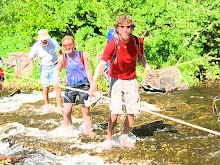Survey Says...
When travelers turn off the main "highway" into our town, they are greeted with the usual assortment of signs: center-of-town this way, hotel in 3 kilometers, gas station in 1 kilometer. And then there's this one, denoting the city limit and supplemented by someone with some extra information about the town:

"A city without Albanians" the spray paint gleefully exclaims. Just for good measure, the author used the derogatory term for Albanians and threw a few crosses on there as well to underline the religious differences between the ethnic groups.
The statement is true: there are no Albanians living in town. A friend tells us that several years ago there was an Albanian man living here, but that he was effectively run out. This friend also tells us that it's not uncommon to hear people express the belief that were another Albanian to move here, the same fate would befall him.
Now, I don't want to leave you with the impression that there are citizen patrols marching the streets with pitchforks and burning crosses, chanting things like what's written on that sign. It would be very easy to get carried away and make the situation sound worse than it is. It's mostly an us-versus-them mentality born of the region's history of ethnic conflict and a general fear of the unknown. People here speak of the western cities of Tetovo and Gostivar--where the majority of the country's ethnic Albanians live--with great trepidation and are shocked to hear there are PCVs there. In fact, while teaching our adult English class about cardinal directions, we asked, "Is Gostivar north or south of Tetovo?" Not a single person among the nine knew the answer. This would be like growing up in New York City and not knowing if Washington D.C. is north or south of Philadelphia. The geography of that part of the country, like the people living there, is a mystery.
It was against this backdrop last week that Bube and Tina conducted a survey in the high school. In a little over a month there's a youth leadership conference to be held in Kosovo for students from all over the Balkans and the girls are submitting a research paper in hopes of being invited to present. In short, really cool stuff. They chose to focus on ethnic attitudes among high school students. It's a particularly interesting question here, where most young people have no contact with Albanians and yet--thanks to family, friends and the media--have developed rather strong opinions on the matter.
Bube and Tina wrote a very strong, thought-provoking survey and distributed it to over 150 students during their English classes. I was impressed (and relieved) to see most students answer the survey's questions quietly and maturely. Many of the queries must have been things that the students had never really considered and, in fact, the results seem to say just that.
I won't bore you with a whole litany of statistics, though if you are interested in seeing the full results, leave your email address in the comments section and I'm sure Bube and Tina would be happy to share them with you. I'll just touch on a few that I thought were particularly telling.
When asked if they believe that Albanians have the same rights as Macedonians, 58% answered Yes or Definitely Yes. But in the very next question, when asked if Albanians deserve to have the same rights, 53% answered No or Definitely No.
Now consider the response to the question, "Do you think that inter-ethnic relations need to be improved?" A whopping 79% answered Yes or Definitely Yes. So there is recognition of the problem--but how to reconcile this with the fact that the majority of students don't believe in equal rights for Albanians? How could the situation be "improved" working from such a baseline?
There is some hope offered later in the survey, however. 90% of students responded that they have never taken part in a program or project to improve relations between the ethnic groups and 67% responded Yes, Definitely Yes or Maybe when asked if they would consider it. That's very promising. To wit, in the disaggregate data (I'm telling you, Bube and Tina did a great job) the group with the highest participation in programs to improve inter-ethnic relations, Females Who Know an Albanian, consistently gave the most open-minded responses to questions.
If nothing else, this survey provided a small piece of what is so desperately needed: a pathway through which an honest dialogue about ethnic relations can begin. If even one student was pushed to consider this subject in ways that he or she never had before or if the questions provoked even the smallest of discussions, then there was some real value beyond the research.
But ultimately it is the research that must be lauded. Showing impressive initiative and proving (again) why any college in America would be lucky to have them, Tina and Bube did a fantastic job and with any luck will be able to present these important findings, along with their solutions, to a professional panel and their peers. They are two reasons to be optimistic about Macedonia's future.


No comments:
Post a Comment